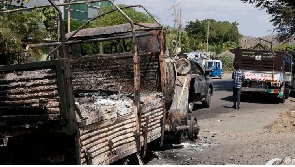 Military vehicle damaged in Dessie town of Amhara city, Ethiopia
Military vehicle damaged in Dessie town of Amhara city, Ethiopia
Kenya and Uganda are scrambling to know the whereabouts of their nationals in troubled Amhara region of Ethiopia, nearly a week after Addis Ababa declared a state of emergency to contain a rebellion.
Diplomats for both countries in Addis Ababa said they were monitoring the situation in Amhara but could not determine how many of their nationals were trapped, or if at all there had been any.
The revelations came as the Ethiopian government went on to target rebels who have since last week forced authorities to suspend normal law in Amhara, north of the capital Addis Ababa.
Clashes between the Ethiopian National Defence Forces and the militia group known as Adamo forced authorities to declare a six-month state of emergency in Amhara. But there had been other clashes between the army and the Fano group, which opposes the government move to disarm regional militias in a bid to build a unified national army.
The situation led to various unverified claims of a number of Kenyans trapped in Gondar, one of the towns in Amhara where clashes had hit.
But a statement from the Kenyan Embassy in Addis Ababa said it was still monitoring the situation while asking any stranded nationals to contact the mission.
“All Kenyan Nationals are therefore advised to: Adhere to the Rules and Regulations issued by the Government of Ethiopia in relation to the State of Emergency in the Amhara Region. Avoid movement in insecure areas. Contact Kenya Embassy Addis Ababa through the outlined channels," the statement read.
It gave the contacts as keaddisababa@gmail.com, addisababa@mfa.go.ke and phone numbers: +251 11 6610135/6, +251-929-107-859, and 251976056336 and +254114757002.
The embassy didn’t say whether any Kenyans had reached out or whether it had found out about those trapped. However, a spokesperson at the Ministry of Foreign and Diaspora Affairs told The EastAfrican they will monitor the situation.
In Uganda, the country’s Ambassador to Ethiopia Rebecca Otengo said she had communicated the situation to her headquarters in Kampala to advise on the next cause of action but did not comment on any trapped Ugandans. Earlier, a spokesperson at the Ugandan Ministry of Foreign Affairs had indicated they were monitoring developments too.
The situation in Amhara could yet indicate the persistent problems regarding responding to diaspora situations by East African countries. When war broke out in Tigray in November 2021, most of the stranded nationals relied on other rescuers to flee the region where Ethiopian forced fought with the Tigray People’s Liberation Front (TPLF). The two sides signed a peace deal in November last year.
But the situation in Amhara is partly a residue from the Tigray war. After the peace deal, the Ethiopian government said it would disarm all regional militia, including those who fought alongside national forces against TPLF, to strengthen unity in the national army. Some groups have opposed the move as weakening their security apparatus. Fano in particular accuse Amhara regional forces of targeting their community.
The state of emergency declared by the Ethiopian Council of Ministers on Friday saw the establishment of the General Department Command to be chaired by Temesgen Tiruneh, the country’s spy chief.
The Command says the rebellion had obstructed public service and rescued criminals from jails as well as forcing farmers to flee.